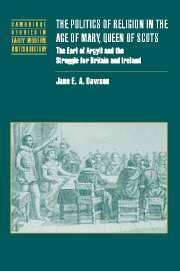 The Politics of Religion in the Age of Mary, Queen of Scots
The Politics of Religion in the Age of Mary, Queen of Scots Book contents
- Frontmatter
- Contents
- List of figures
- Acknowledgements
- List of abbreviations
- Prologue: 1560: British policies and the British context
- 1 Argyll's life and character
- 2 Semi-sovereign prince
- 3 The creation of a British policy: 1558–1560
- 4 The collapse of amity: 1561–1565
- 5 The reconfiguration of British politics: 1566–1568
- 6 The withdrawal from British politics: 1569–1573
- Conclusion: The earl of Argyll and British politics in the age of the three kingdoms
- Chronology, 1558–1573
- Bibliography
- Index
4 - The collapse of amity: 1561–1565
Published online by Cambridge University Press: 20 July 2009
- Frontmatter
- Contents
- List of figures
- Acknowledgements
- List of abbreviations
- Prologue: 1560: British policies and the British context
- 1 Argyll's life and character
- 2 Semi-sovereign prince
- 3 The creation of a British policy: 1558–1560
- 4 The collapse of amity: 1561–1565
- 5 The reconfiguration of British politics: 1566–1568
- 6 The withdrawal from British politics: 1569–1573
- Conclusion: The earl of Argyll and British politics in the age of the three kingdoms
- Chronology, 1558–1573
- Bibliography
- Index
Summary
In British politics, the period 1561–5 revolved around the return of Mary, Queen of Scots to rule her native land, with Shane O'Neill's rise providing a sub-theme. In Scotland, Mary's initial acceptance of the Protestant settlement and the Anglophile policies of Argyll, Moray and Maitland brought little upheaval to the country. Within the Gaelic world, Argyll served a hard political apprenticeship through the frustrations and disappointments of his dealings with the Dublin administration. During 1565, the situation in Ulster was transformed by O'Neill's crushing defeat of the MacDonalds, which threatened to remove the Scots from the north of Ireland altogether. It disrupted Gaelic politics on both sides of the North Channel destabilising Ireland and upsetting the British strategies. From the Anglo-Scottish viewpoint, Mary's return raised the question of her second marriage, the issue that dominated relations between the two mainland kingdoms. The Scottish queen's eventual choice of Darnley provoked the British crisis of the Chase-about Raid. It marked the turning point in the 5th earl's attitude towards amity with England, signalling the end of his British policy.
The contrast between Argyll's hopes in 1561 and his situation at the end of 1565 could not have been more stark. The prospects for peace and friendship with England were dazzling at the beginning of the decade. English intervention in the Wars of the Congregation had freed Scotland from French domination and opened the door for the reformation of the Scottish church.
- Type
- Chapter
- Information
- The Politics of Religion in the Age of Mary, Queen of ScotsThe Earl of Argyll and the Struggle for Britain and Ireland, pp. 111 - 142Publisher: Cambridge University PressPrint publication year: 2002


